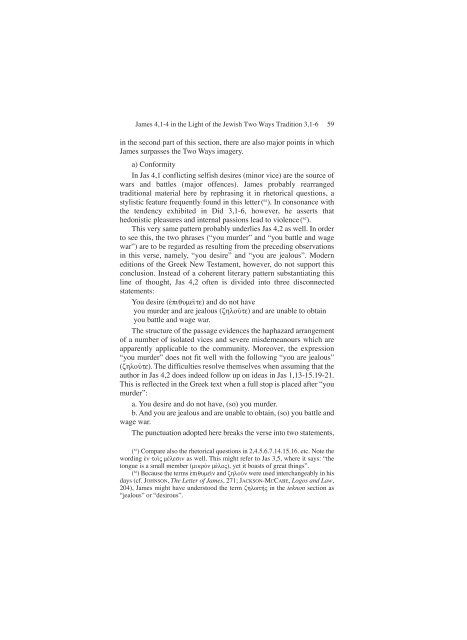James 4,1-4 in the Light of the Jewish Two Ways Tradition 3,1-6
James 4,1-4 in the Light of the Jewish Two Ways Tradition 3,1-6
James 4,1-4 in the Light of the Jewish Two Ways Tradition 3,1-6
Create successful ePaper yourself
Turn your PDF publications into a flip-book with our unique Google optimized e-Paper software.
<strong>James</strong> 4,1-4 <strong>in</strong> <strong>the</strong> <strong>Light</strong> <strong>of</strong> <strong>the</strong> <strong>Jewish</strong> <strong>Two</strong> <strong>Ways</strong> <strong>Tradition</strong> 3,1-6 59<br />
<strong>in</strong> <strong>the</strong> second part <strong>of</strong> this section, <strong>the</strong>re are also major po<strong>in</strong>ts <strong>in</strong> which<br />
<strong>James</strong> surpasses <strong>the</strong> <strong>Two</strong> <strong>Ways</strong> imagery.<br />
a) Conformity<br />
In Jas 4,1 conflict<strong>in</strong>g selfish desires (m<strong>in</strong>or vice) are <strong>the</strong> source <strong>of</strong><br />
wars and battles (major <strong>of</strong>fences). <strong>James</strong> probably rearranged<br />
traditional material here by rephras<strong>in</strong>g it <strong>in</strong> rhetorical questions, a<br />
stylistic feature frequently found <strong>in</strong> this letter( 61 ). In consonance with<br />
<strong>the</strong> tendency exhibited <strong>in</strong> Did 3,1-6, however, he asserts that<br />
hedonistic pleasures and <strong>in</strong>ternal passions lead to violence( 62 ).<br />
This very same pattern probably underlies Jas 4,2 as well. In order<br />
to see this, <strong>the</strong> two phrases (“you murder” and “you battle and wage<br />
war”) are to be regarded as result<strong>in</strong>g from <strong>the</strong> preced<strong>in</strong>g observations<br />
<strong>in</strong> this verse, namely, “you desire” and “you are jealous”. Modern<br />
editions <strong>of</strong> <strong>the</strong> Greek New Testament, however, do not support this<br />
conclusion. Instead <strong>of</strong> a coherent literary pattern substantiat<strong>in</strong>g this<br />
l<strong>in</strong>e <strong>of</strong> thought, Jas 4,2 <strong>of</strong>ten is divided <strong>in</strong>to three disconnected<br />
statements:<br />
You desire (ejpiqumei'te) and do not have<br />
you murder and are jealous (zhlou'te) and are unable to obta<strong>in</strong><br />
you battle and wage war.<br />
The structure <strong>of</strong> <strong>the</strong> passage evidences <strong>the</strong> haphazard arrangement<br />
<strong>of</strong> a number <strong>of</strong> isolated vices and severe misdemeanours which are<br />
apparently applicable to <strong>the</strong> community. Moreover, <strong>the</strong> expression<br />
“you murder” does not fit well with <strong>the</strong> follow<strong>in</strong>g “you are jealous”<br />
(zhlou'te). The difficulties resolve <strong>the</strong>mselves when assum<strong>in</strong>g that <strong>the</strong><br />
author <strong>in</strong> Jas 4,2 does <strong>in</strong>deed follow up on ideas <strong>in</strong> Jas 1,13-15.19-21.<br />
This is reflected <strong>in</strong> <strong>the</strong> Greek text when a full stop is placed after “you<br />
murder”:<br />
a. You desire and do not have, (so) you murder.<br />
b. And you are jealous and are unable to obta<strong>in</strong>, (so) you battle and<br />
wage war.<br />
The punctuation adopted here breaks <strong>the</strong> verse <strong>in</strong>to two statements,<br />
( 61 ) Compare also <strong>the</strong> rhetorical questions <strong>in</strong> 2,4.5.6.7.14.15.16. etc. Note <strong>the</strong><br />
word<strong>in</strong>g ejn toi'" mevles<strong>in</strong> as well. This might refer to Jas 3,5, where it says: “<strong>the</strong><br />
tongue is a small member (mikro;n mevlo"), yet it boasts <strong>of</strong> great th<strong>in</strong>gs”.<br />
( 62 ) Because <strong>the</strong> terms ejpiqumei'n and zhlou'n were used <strong>in</strong>terchangeably <strong>in</strong> his<br />
days (cf. JOHNSON, The Letter <strong>of</strong> <strong>James</strong>, 271; JACKSON-MCCABE, Logos and Law,<br />
204), <strong>James</strong> might have understood <strong>the</strong> term zhlwthv" <strong>in</strong> <strong>the</strong> teknon section as<br />
“jealous” or “desirous”.


